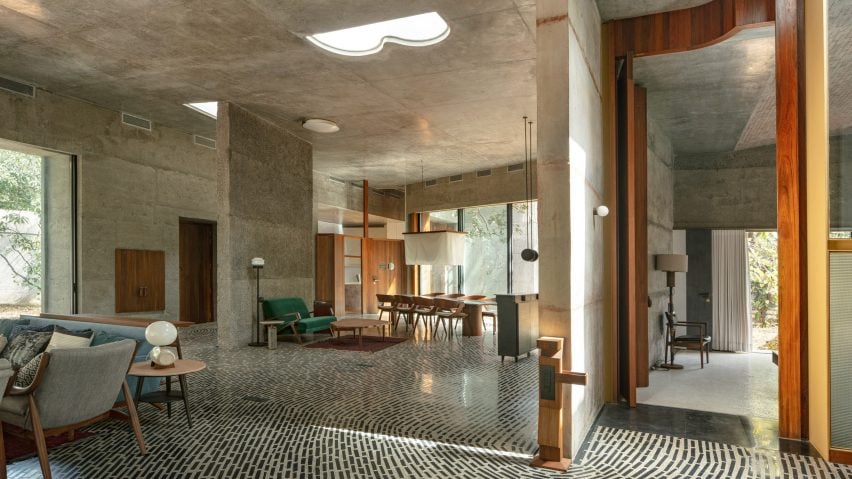For our latest lookbook, we've collected 10 brutalist interiors from the UK to Brazil and Indonesia that show how textiles, plants and colours can be used to soften monolithic concrete spaces and create a cosy atmosphere.
Brutalism as an architectural style often makes use of concrete to create large, sculptural buildings. These interiors in brutalist buildings feature plenty of concrete and hard angles but still manage to feel both warm and welcoming.
Colourful tiling, wooden details and tactile textiles as well as an abundance of green plants were used to create inviting living rooms, bathrooms and even workspaces in these brutalist buildings, which include the Barbican in London and Riverside Tower in Antwerp.
This is the latest in our lookbooks series, which provides visual inspiration from Dezeen's archive. For more inspiration see previous lookbooks featuring granite kitchens, terrazzo eateries and atriums that brighten up residential spaces.
A Brutalist Tropical Home, Indonesia, by Patisandhika and Dan Mitchell
Designer Dan Mitchell worked with architecture studio Patisandhika to create this brutalist home in Bali, which features a double-height living room filled with books, records and green plants.
The house has a split-level design that was modelled on modernist architect Ray Kappe's Kappe Residence. Inside, colourful objects, textiles and furniture draw on the work of Clifford Still, Ellsworth Kelly and the Bauhaus movement to make the house feel homely.
Find out more about A Brutalist Tropical Home ›
House of Concrete Experiments, India, by Samira Rathod
As the name suggests, House of Concrete Experiments features sculptural concrete walls. Warm wood detailing offsets the grey hues, while the concrete floor has been inlaid with black stones to create an interesting pattern.
Large windows and geometric skylights help make the room feel bright and inviting.
Find out more about House of Concrete Experiments ›
Riverside Tower Apartment, Belgium, by Studio Okami Architecten
Studio Okami Architecten stripped the walls of this flat in Antwerp's Riverside Tower to let its original structure take centre stage.
Colourful details such as a turquoise table and baby-blue spiral staircase and a playful, sculptural lamp make the home feel contemporary, while plenty of green plants give more life to the otherwise grey interior.
Find out more about Riverside Tower Apartment ›
Beton Brut, India, by The Grid Architects
Designed as a "neo-brutalist" house, Beton Brut in India has a number of dramatic features, including a skylit atrium that extends through the home.
The Grid Architects described the home as "typified by bare concrete, geometric shapes, a monochrome palette and a monolithic appearance". Wooden flooring and furniture and plenty of textiles soften the house's brutalist interior and potentially stern appearance.
Find out more about Beton Brut ›
Barbican flat, UK, by Takero Shimakazi Architects
This flat in the Shakespeare Tower of London's brutalist Barbican estate was overhauled by Takero Shimakazi Architects in a nod to the client's strong ties to Japan.
Details such as gridded timber panels and timber joinery were added throughout the flat, which also features Japan-informed details including an area lined with tatami mats.
Find out more about the Barbican flat ›
Concrete home, Brazil, by Debaixo do Bloco Arquitetura
Debaixo do Bloco's design for this sculptural house in Brazil is divided into three sections to provide a clear distinction between the various programmes.
Inside, the interior has a mid-century modern feel, with gleaming wood parquet flooring and a glass PH table lamp by Danish designer Louis Poulsen decorating a side table.
Find out more about the concrete home ›
Smithson Tower office, UK, by ConForm
The brutalist Smithson Tower in Mayfair is the location for this "homely" office designed by ConForm Architects. The studio split the space into eight zones defined by the strong structural grid of the existing building, and added low-level joinery.
The result is a design that softens the stark office spaces and makes the rooms feel more intimate.
Find out more about the Smithson Tower office ›
The Standard London, UK, by Shawn Hausman
Designer Shawn Hausman created the colour-drenched interior of hotel The Standard in London, which is located in a brutalist building, to contrast "the greyness of London".
"I would say with this property we were a bit more colourful than usual, and I think part of that is acting in contrast to the brutalist building that the hotel's in," explained Hausman.
In the bathrooms, stripy pink-and-black tiled walls and pops of pale mint green give the room a fun, playful feel.
Find out more about The Standard London ›
Preston Hollow, US, by Specht Architects
The long corrugated concrete volumes of Preston Hollow in Dallas were designed to reference brutalist Texan architecture from the 1950s and 60s, but the house was built to wrap around courtyards, creating a lively, open impression.
Inside the low-slung buildings, mid-century modern-style furniture nods to the home's architectural references but the interior is brought up-to-date with the addition of modern art.
Find out more about Preston Hollow ›
Barbican apartment, UK, by John Pawson
British architect John Pawson created this flat in London's Barbican building using his signature minimalist aesthetic.
The flat, which overlooks central London and has a small concrete balcony, has been kept almost empty with just a smattering of furnishings and pale wooden surfaces. Three artworks, a Buddha sculpture and a grandfather clock are the only decorative elements in the space.
Find out more about the Barbican apartment ›
This is the latest in our lookbooks series, which provides visual inspiration from Dezeen's archive. For more inspiration see previous lookbooks featuring granite kitchens, terrazzo eateries and atriums that brighten up residential spaces.

